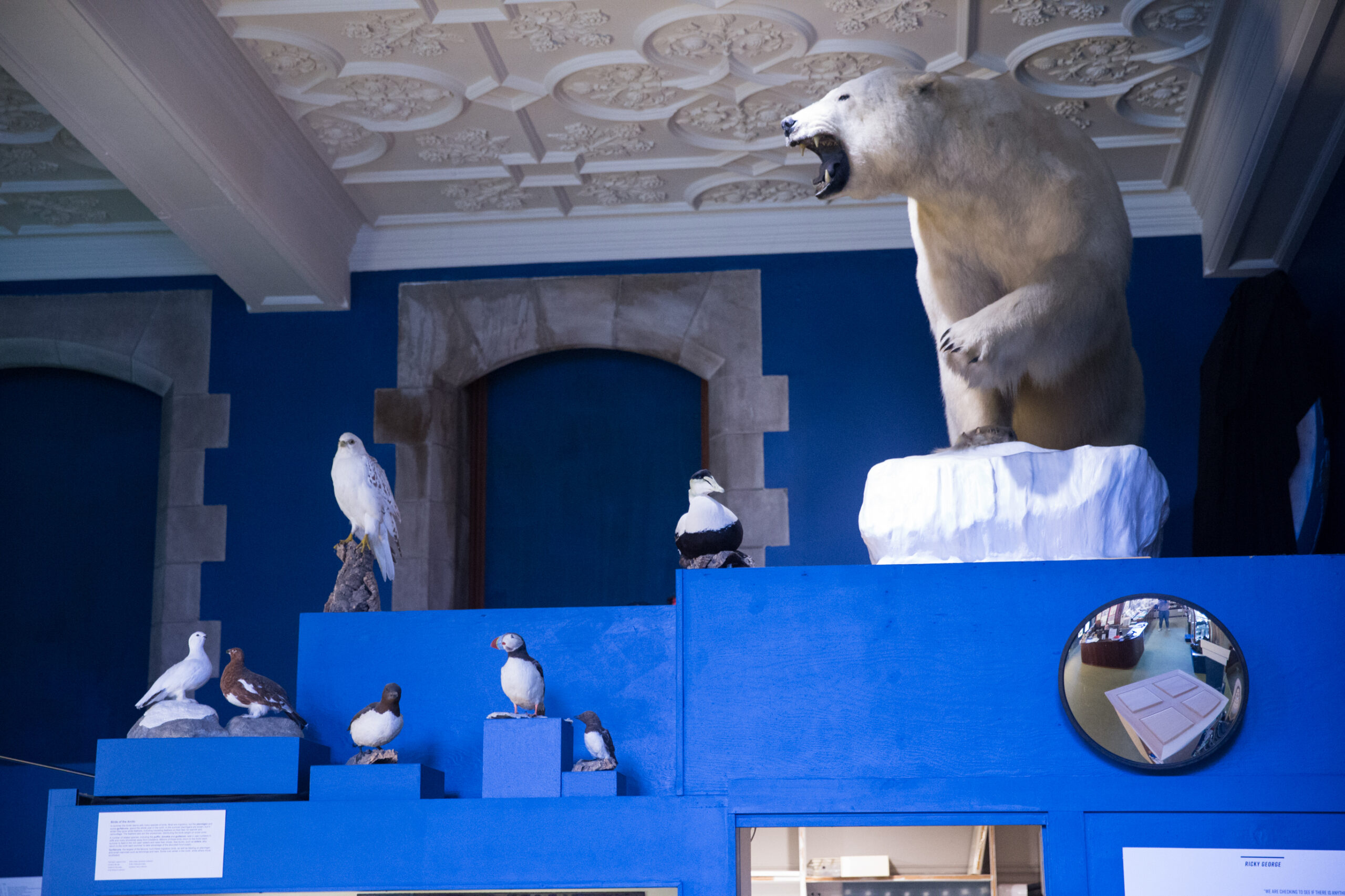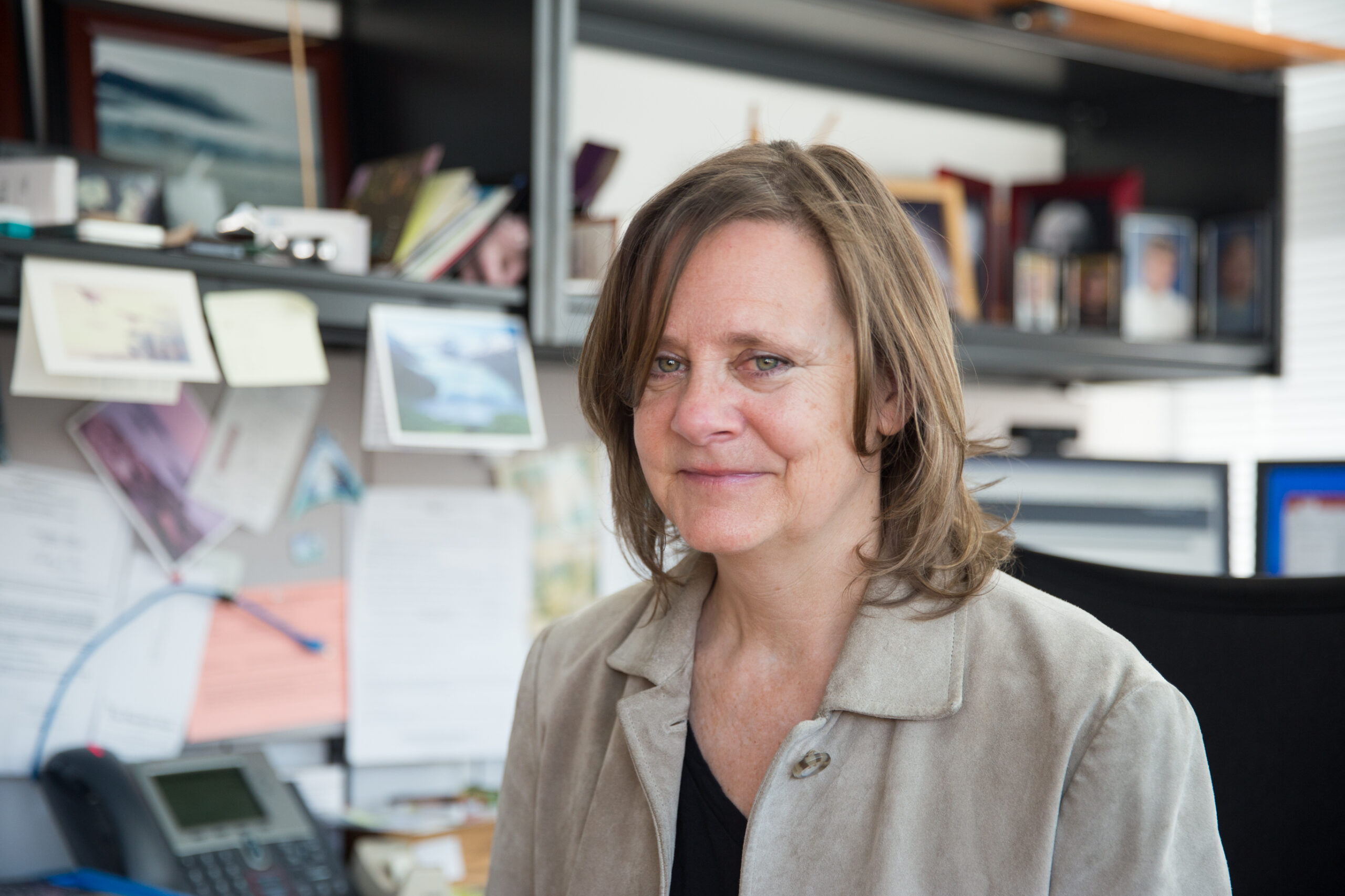Studying the arctic in the era of climate change
May 4, 2018
 Ann Basu
Ann BasuWith its history of Arctic exploration and museum research, Bowdoin’s connection to the Arctic go way back. Today, with issues still surrounding various polar environments, Bowdoin continues to make strides in the field, as exemplified through a continuous, cross-disciplinary pursuit by faculty members across several academic departments.
Since its establishment in 1985, the Arctic Studies program has always defied simple categorization. True to Bowdoin’s liberal arts foundation, Arctic research is deeply intertwined with cultural, social and political matters beyond the confines of science. At the heart of this scholarship is a holistic understanding of its unique environmental as well as human conditions.
Professor of Anthropology and Director of the Peary-MacMillan Arctic Museum and Arctic Studies Center Susan Kaplan spent over 30 years expanding the scope of the museum’s collection to not only document history but also present contemporary culture. With her own research focusing on Inuit responses to environmental change and contact with the West, Kaplan reflects on the museum’s mission.
“We didn’t want people to think that Inuit and other groups were stuck in the 1950s and earlier … [The museum tries] to alternate so that sometimes we have an exhibit on a region, sometimes it’ll be on a topic, sometimes it’ll be art. It might be science; it might be social science. It’s very interdisciplinary,” said Kaplan.
This conscious effort to bring in diverse perspectives is reiterated in the setup of the Arctic Studies concentration, which is aimed at training students to critically navigate issues relevant to the Arctic.
“The goal isn’t to send students to graduate school,” Kaplan said. “The goal is to have students who have understanding of the environmental, social, cultural complexities of the Arctic, so when they go and they have careers, as teachers or social workers or doctors or lawyers, they will be good creative problem solvers.”
With rapid climate change and additional passages opening up in the Arctic, expertise in comprehensive problem-solving is in high demand. Bowdoin students are close to the problem—Kaplan specifically referenced Portland’s potential status as a near-Arctic port. Climate change will increase traffic to the Arctic, which will have dualistic effects—boosting the Portland economy while exacerbating the existing environmental concerns in the Arctic.
“[The locals] are getting absolutely no economic profits. They are assuming all of the dangers… you’re adding pollution; you’re accelerating a warming that is already out of control,” Kaplan said. “There’s a history in the Arctic, as there are in other places, of outside cultures coming in, exploiting resources and leaving.”
The complex economic condition of the Arctic and surrounding nations is right Alyssa Grahame’s alley. The visiting assistant professor of Government studies contentious responses to the financial crisis in northwestern Europe, specifically in the Arctic.
 Ann Basu
Ann Basu“Iceland was recovering from the financial crisis and the Great Recession. One of the ways in which they were pursuing this recovery was by trying to reinvent themselves as a kind of natural gateway to the Arctic,” she explained. “This repositioning of the country and its economy as an Arctic capital coincides with climate change and growing political and economic interests in the Arctic, especially as the ice melts and new shipping routes might be opening up as well.”
As a comparative political scientist, Grahame remains wary of the fact that Arctic countries have begun to regard climate change as offering profitable opportunities.
“I think we need to be critical of this language of opportunity because I see it as depoliticizing climate change, and we have to think about who would benefit from the opening of the Arctic and who suffers.”
“People who live in regions that are at risk to rising sea levels or the loss of land or desertification associated more broadly with climate change are not going to benefit from the opening of the Arctic,” she continued. “So I think when we talk about opportunities, I think we need to see what the bigger picture is here.”
Grahame sees a responsibility for scholars to actively engage with the tension between nations’ profit-maximizing mindset and environmentalist concerns. Collin Roesler, professor of Earth and Oceanographic Science agrees with Grahame. Indeed, climate change is of paramount importance in determining not only the future of the Arctic, but also the entire globe.
“Everything about our world is controlled by processes in the Arctic atmosphere, in the Arctic ocean and in the sea ice … So you may not care about it, but it doesn’t matter whether you care or not; it’s going to be impacting our lives in very fundamental ways,” Roesler said.
Roesler breaks down the myth about sea level rising as a slow, steady process, calling for immediate action.
“We’re really starting to see the ice melt, but the ice has been melting for a long time. Its been absorbing a lot of heat, and cold ice can absorb a lot of heat before it melts … And now it’s at that threshold, and that’s why it’s melting so quickly now,” said Roesler. “I think people sometimes feel very intuitive about the environment, but sometimes your intuition is wrong, and this is a case where people were wrong.”
Roesler, whose current research focuses on ocean ecosystems, has spent multiple field seasons up in the Arctic studying dynamics of sea ice. She later went down to Antarctica, in total spending over 300 days at sea on major research vessels.
“I got stuck in Antarctica twice on a ship, getting locked in the ice for months,” she added.
Combining her research experience with an interdisciplinary approach, Roesler teaches a course named “Poles Apart,” which incorporates elements of polar exploration through first-hand historical accounts and literature.
“I start them with a book by Fridtjof Nansen,who is the famous Norwegian explorer … so [students] are able to experience the cold and the dark and the wet and the saltiness and the smell—all of it—as we’re learning about the Arctic,” said Roesler.
Roesler ultimately wishes to provide students with a sense of place, bearing a certain level of relevance in the face of challenges proposed by the Arctic.
“At Bowdoin, we have a legacy here … There are so many reasons why students at Bowdoin should find a connection to the Arctic even if they haven’t been, simply because of the legacy of the College.”

Comments
Before submitting a comment, please review our comment policy. Some key points from the policy: